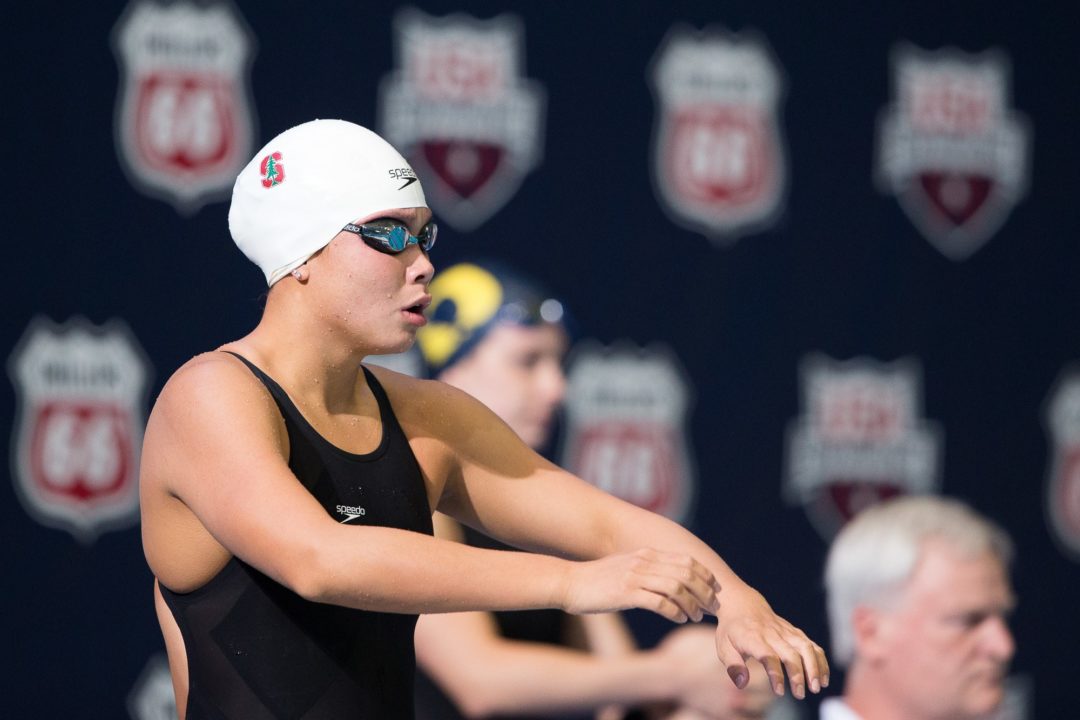A rivalry that was one of the country’s premier inter-conference showdowns in the 80’s and 90’s has been revived, and for the second-straight year of this home-and-home series, the battle between Texas and Stanford came down to the final relay.
This time, in Austin, however, it was Greg Meehan’s Stanford Cardinal who came away with the final relay and the meet victory, winning a narrow 154-146 victory.
In a back-and-forth affair, Texas’ diving crew gave them the lead twice in this meet, but at the final touch, Stanford had just a little more depth in the freestyle races to come away with the win. Both teams, however, will come away with a lot of big swims to hang their hats on as they roll into the meat of their dual schedules.
Heading into the final relay, Stanford led Texas 143-140. That meant that the winner of the final relay would win the meet, regardless of what happened after that.
From the start, it was clear that Stanford would not be challenged in the relay. With Maddy Schaefer (49.64), Felicia Lee (48.74), Julia Anderson (50.98), and Lia Neal (49.62), the Cardinal cruised to a 3:18.98 beating out Texas’ 3:21.42 that placed 2nd. For Stanford, that’s a bit of a different relay than what they’ve used as their best; at NCAA’s, Maya DiRado, rather than Anderson, is likely to be on this relay, but here they chose to use DiRado in three individual events instead, and the decision paid-off in a big way.
It worked because DiRado won all three of her events. She took the 200 fly in 1:59.04, which beat Texas senior Victoria Cassidy and her 2:01.67. For the senior Cassidy, that just missed her season-best.
DiRado was queen of the 200’s at this meet; she would also win the 200 back in 1:57.35, beating Texas freshman Tasija Karosas’ 1:58.21, and the 200 IM in 1:59.60, beating Texas’ Madisyn Cox in 2:02.38.
Texas also gambled, leaving their top sprinter Ellen Lobb off of their 400 free relay, and that decision didn’t work out quite as well for them. While she probably wouldn’t have made the difference in the closing relay, it would have made things close enough that she could have made the difference. Meanwhile, in her individual events, after an impressive win in the 50 free in 22.82 (beating the All-American Schaefer in 22.96), Lobb wound up just 3rd in the 100 free (50.84 – tied with freshman teammate Brynne Wong) and 3rd in the 100 fly (55.46).
Those races were both won by Stanford. In the 100 free, Stanford freshman Lia Neal won in 49.75, and in the 100 fly, Stanford senior Felicia Lee won in 53.20. That swim by Lee is one more indicator that Lee has finally overcome the health issues that plagued her earlier in her career and is on track for a big year. That time is only eight-tenths of a second slower than she was in the Cardinal’s mid-season taper meet in November.
Stanford freshman Nicole Stafford was 2nd in that 100 fly in 55.12.
Lee would add a second win in the 100 back, posting a 53.91 to beat Karosas (55.17) and Lily Moldenhauer (55.46).
Texas’ divers and their breaststrokers kept them in this meet. On the 1-meter, the Longhorns got a 1-2-3 finish from Maren Taylor, UCLA transfer Emma Ivory-Ganja, and Meghan Houston. All three of them should be scorers at NCAA’s, as should Stanford’s 4th-place finisher Stephanie Phipps, who is trying to bounce back after missing NCAA’s last year (despite being the Pac-12 champion on the 3-meter).
On the 3-meter, it was more of the same; though they could only score their top three, Texas finished 1-4, with Taylor again coming away with a win.
In the breaststrokes, it was junior Gretchen Jaques who earned the sweep. She won the 100 in 1:01.23, beating out Katie Olsen (1:01.55) and Sarah Haase (1:02.04) from Stanford. Having three swimmers going 1:02.0 in early January is a very good performance for this time of year in a dual meet.
In the 200 breast, Jaques won again, this time posting a 2:12.83 to beat Olsen by just over a second. Olsen was a 2:13.91, and Haase was 3rd in 2:16.27.
Texas also got a big 1-2-3 in the women’s 200 free, led by Sam Tucker (1:48.93), and Alex Hooper (1:48.98). They topped Stanford’s top finisher the Olympian Neal, who was a 1:49.40 for 4th.
But Stanford’s firepower was just too much, as they won 10 out of 16 events. That included the meet’s first two race: the 200 medley relay, where they were a 1:40.53, and the 1000 free, where Andie Taylor won in 9:57.01. That was one of two wins for Taylor, who was the class of the distance field at this meet, as she also took the 500 in 4:50.88 – a three-and-a-half second margin of victory.
Those we spoke to at Stanford indicated that this great series would continue for at least another two years – continuing the pattern of a November meeting in Palo Alto, and then a January meeting in Austin the following year. That’s good news for swimming, as the two teams, both with relatively new coaches, have a long history, and present good competitive dual meets year-in and year-out: something often lacking on the NCAA schedule.
Stanford now goes back into another three weeks of training before they welcome in Arizona and Arizona St. on January 24th and 25th, while Texas will jump right back in with two more big home meets, as they welcome in Auburn and Georgia on January 9th and 11th.
